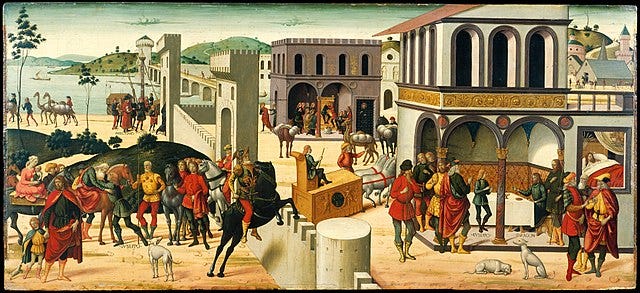In the related lectionary this Sunday we find a short reading from the latter part of the story about Joseph and his brothers (Gen 50:15-21). The ‘Joseph cycle’ begins in chapter 37 and ends in chapter 50. In what follows, we will think about two themes in this passage and how it relates to the gospel reading. The first theme is deception…
The Story of Joseph, Biagio d'Antonio, 1476-1504, wikimediacommons
Deception in the Joseph Cycle
The narrative that begins in Genesis 37 is quite the wild ride! In it, we find attempted murder, kidnap, illicit relationships, and more. One of the most notable themes in the Joseph cycle is that of deception. If you read it from start to finish with an eye for every time someone lies to someone else, you’ll find quite the web of deception. Here are some examples;
Joesph’s brothers deceive their father into thinking that Joseph has been killed (37:32)
Judah deceives Tamar into thinking that he will give her his youngest son to marry (38:11)
Tamar deceives Judah into thinking she is a sex worker (38:15)
Potiphar’s wife deceives her husband into thinking that Joseph attached her (39:17)
Joseph deceives his brothers about his identity (42:7), then about the money in their sacks (42:26), then about the silver cup (44:2)
And the list goes on! Nobody in the story, except perhaps Jacob, gets away without being involved in some kind of lie by the end of the narrative. This is part of what makes it such an interesting story to read!
With all of this context, you can understand the trepidation that Joseph’s brothers experience after the death of their father. In 50:15 they wonder whether he might still bear a grudge against them after what they did to him at the beginning of the story. Perhaps the spiral of deception would have to start again as they defended themselves against whatever punishment he felt appropriate.
But it was not to be so. In v21 the text says that after hearing of their fears, Joesph ‘reassured them, speaking kindly to them’. This was possible because the brothers were finally honest about their concerns, giving Joseph the opportunity to earnestly reassure them. The deceptions were at an end, and their relationships had mended. This brings us to the second theme…
Forgiveness
The resolution of the Joseph cycle is one which is marked by forgiveness. In response to his brother’s question about whether they will be punished for their sin at the beginning of the story, he says in v19-20
‘Do not be afraid! Am I in the place of God? 20Even though you intended to do harm to me, God intended it for good, in order to preserve a numerous people, as he is doing today’
Joseph is able to see beyond the suffering that was inflicted on him, and the injustice of that, and to offer forgiveness to his brothers. It is not always possible, as Joseph does, to see God’s wider purpose in suffering. Sometimes times of suffering are marked by confusion and suffering without any sense of purpose. But here Joseph does see that although brothers meant to harm him, God used their selfish actions for the good of his people.
It is the theme of forgiveness that coheres most clearly with the gospel reading (Matthew 18:21-35). In it, Peter comes to Jesus and asks:
‘‘Lord, if another member of the church sins against me, how often should I forgive? As many as seven times?’ 22Jesus said to him, ‘Not seven times, but, I tell you, seventy-seven times’
He goes on to tell the story of the indebted slave, which emphasises the importance of responding to the mercy that God has shown us by showing mercy to others. In a way, deception is at play here too, because it is easy for us to deceive ourselves into believing that we are somehow less in need of God’s grace than others. Both stories emphasise the need for us to be honest with ourselves, with others and with God.





Thank you this has helped me to frame my intercessions on Sunday